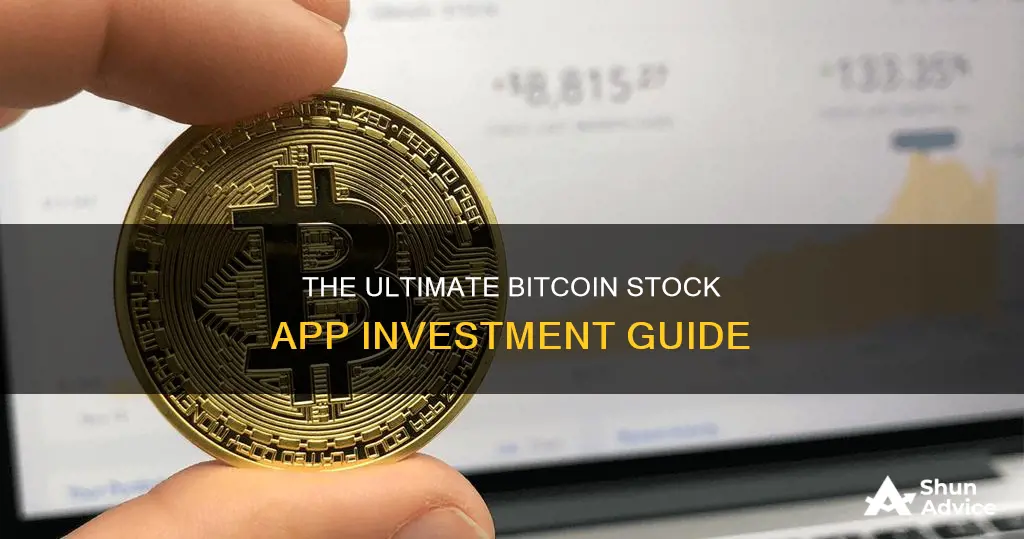
Bitcoin is a popular type of cryptocurrency that has seen a recent surge in value, outpacing traditional gains in the stock market. As a result, more people are buying into Bitcoin, which is becoming a decentralized, global currency.
There are several ways to invest in Bitcoin, both directly and indirectly. For example, you can invest in a company that utilizes Bitcoin technology, or participate in Bitcoin mining.
If you're looking to buy and sell Bitcoin, you'll likely want a crypto exchange. There are many exchanges to choose from, some with a longer track record than others. When comparing exchanges, investors can consider fees, cryptocurrency selection, advanced trading options, and customer service offerings.
- Coinbase
- Binance
- Kraken
- Gemini
- Bitfinex
What You'll Learn

Choosing a crypto exchange
Crypto exchanges are platforms that allow people to buy and sell cryptocurrencies like Bitcoin. You can use the exchanges to trade one cryptocurrency for another or to purchase the cryptocurrency using regular fiat currencies like the USD or GBP.
There are hundreds of cryptocurrency exchanges available, so choosing the right one is important. Here are some factors to consider when selecting a crypto exchange:
- Authenticity and security: Research the exchange to determine if it is a legitimate and secure platform. Check the reputation of the platform and the various security protocols they have in place to protect your data and funds.
- Payment methods: Some platforms support bank transfers, while others use PayPal, credit cards, or debit cards. Some platforms only accept cryptocurrency for purchases. Choose an exchange that offers a payment method that suits your needs.
- Supported coins and tokens: While most exchanges support Bitcoin and Ethereum, there are thousands of other cryptocurrencies. If you want to invest in coins beyond Bitcoin and Ethereum, make sure the exchange supports them.
- Transaction fees: Understand the fee structure of the exchange, as fees can vary significantly. Choose an exchange with transparent and competitive fees.
- User interface and experience: An exchange with an intuitive interface and good user experience will make it easier to trade cryptocurrencies. Also, consider the customer service and other customer-related functionalities offered by the exchange.
- Binance: One of the most popular and powerful crypto exchanges, offering access to hundreds of coins and advanced charting tools.
- Coinbase: Widely used, especially in the US, and provides insured custodial wallets for investors. However, it offers fewer cryptocurrencies than some other exchanges.
- Kraken: One of the oldest and most reputable exchanges, offering access to hundreds of cryptocurrencies and funding options.
- CEX.io: Has an excellent user interface, making it a good choice for beginners. It offers access to a wide range of cryptos, including Bitcoin, Ether, and Litecoin.
- Crypto.com: Offers a very good selection of cryptocurrencies (over 250) and provides unique perks and rewards for its Visa Card users.
- Gemini: Available in all 50 US states and highly secure, with strong compliance and robust security protocols. It offers a simple, intuitive user interface and a range of features, like the Gemini Earn program.
The Ultimate Guide to Investing in Dogecoin
You may want to see also

Setting up a wallet
Hosted Wallets
Hosted wallets are the most popular and easy-to-set-up option. When you buy crypto through an app, such as Coinbase, your cryptocurrency is automatically placed in a hosted wallet. This is similar to how a bank holds your money in a checking or savings account. The main benefit of a hosted wallet is that if you forget your password, you won't lose your crypto. However, a drawback is that hosted wallets don't provide access to all the features that crypto has to offer. To set up a hosted wallet:
- Choose a platform that you trust, prioritising security, ease of use, and compliance with government and financial regulations.
- Create your account by entering your personal information and choosing a secure password. It is recommended to use two-factor authentication (2FA) for added security.
- Buy or transfer crypto. Most platforms allow you to buy crypto using a bank account or credit card, or you can transfer existing crypto to your hosted wallet.
Non-Custodial Wallets
Non-custodial wallets, like the Coinbase Wallet, give you complete control over your crypto. With these wallets, you don't rely on a third party to keep your crypto safe. While the platform provides the necessary software to store your crypto, you are solely responsible for remembering and safeguarding your password, often referred to as a "private key" or "seed phrase". If you lose or forget this password, you won't be able to access your crypto. To set up a non-custodial wallet:
- Download a wallet app, such as Coinbase Wallet.
- Create your account. Unlike hosted wallets, non-custodial wallets don't require any personal information, not even an email address.
- Write down your private key, which is typically presented as a random 12-word phrase, and keep it in a secure location.
- Transfer crypto to your wallet. It may not be possible to buy crypto using traditional currencies, so you'll need to transfer crypto from elsewhere.
Hardware Wallets
Hardware wallets are physical devices, similar in size to a thumb drive, that store your private keys offline. They are more complex and costly, but they offer enhanced security, keeping your crypto secure even if your computer is hacked. To set up a hardware wallet:
- Purchase the hardware from well-known brands like Ledger or Trezor.
- Install the software provided by the brand. Download the software from the official website and follow the instructions to create your wallet.
- Transfer crypto to your wallet. Similar to non-custodial wallets, hardware wallets typically don't allow the purchase of crypto using traditional currencies.
Hot Wallets vs. Cold Wallets
Online wallets, also known as hot wallets, are apps on internet-connected devices, such as computers or phones. These wallets generate the private keys to your coins. Hot wallets are best suited for small amounts of crypto or crypto that is actively trading. Cold wallets, on the other hand, are offline wallets that are not connected to the internet, reducing the risk of being compromised. Cold wallets can be paper wallets, where both public and private keys are printed on paper, or hardware wallets that store private keys securely offline. Cold wallets are considered the most secure way to store your crypto but require technical knowledge to set up.
The Ultimate Guide to Investing Bitcoin in Philippines
You may want to see also

Connecting your wallet to a bank account
Once you have chosen a platform, you will need to create an account. This will involve entering your personal information and creating a secure password. It is also recommended to enable two-factor authentication (2FA) for an extra layer of security.
After creating your account, you can link your bank account by following these general steps:
- Navigate to your account settings or dashboard.
- Look for an option to "Add a payment method", "Deposit", or "Transfer".
- Follow the instructions to add your bank account details.
Specific steps may vary depending on the platform you choose, but these are the general steps to connect your wallet to a bank account.
It is important to note that not all platforms support bank transfers. For example, some crypto wallets only allow exchanges between different cryptocurrencies and do not support fiat money. Therefore, it is essential to research the platform before creating an account to ensure it meets your needs.
The Ultimate Guide to Building a Bitcoin Farm Empire
You may want to see also

Placing your Bitcoin order
Market Order
A market order is the simplest type of trade order and is placed by traders who want to be certain that a trade is executed. It is an instant buy or sell of a cryptocurrency for the best available price at that time. Market orders cannot be cancelled as they are filled immediately and may be partially filled at several prices.
Limit Order
A limit order is an instruction to buy or sell a cryptocurrency only at a price specified by the trader. It is best suited for traders who can wait for a price target to be reached. Limit orders give more flexibility with the asset price and amount. They let traders set a minimum price and will only perform at that price or higher. Limit orders are considered "makers" as they inject liquidity into the market.
Stop Order
A stop order is an instruction to buy or sell a cryptocurrency at the market price once a certain price, known as the stop price, has been reached. At this point, the order becomes a market order and is filled at the next available market price. Stop orders can be market or limit orders. A stop-market order executes immediately when the stop price is reached, while a stop-limit order is slightly more complex and is used to minimise risk.
Stop-Limit Order
A stop-limit order is an advanced order type that involves two prices: the stop price and the limit price. The stop price will convert the order to a buy or sell order, and the limit price is the maximum price a trader is willing to pay to buy or the minimum price they are willing to sell at. Stop-limit orders are suitable for traders who are very price-sensitive and want to protect their assets against high market volatility.
Bitcoin Investment: Good or Bad Idea?
You may want to see also

Managing your Bitcoin investments
Investing in Bitcoin can be a complex process, but with the right tools and knowledge, it can be a rewarding experience. Here are some essential tips for managing your Bitcoin investments effectively:
- Choose a reputable platform: When deciding on a platform to invest in Bitcoin, it's crucial to select a well-established and trusted provider. Look for platforms with a good reputation and a track record of secure transactions. Examples of popular platforms include Coinbase, Crypto.com, and Robinhood.
- Understand the risks: Bitcoin is a highly volatile asset, and its value can fluctuate significantly. Before investing, carefully evaluate the risks involved and ensure you are comfortable with the potential for large price swings.
- Diversify your portfolio: Consider diversifying your investments across multiple cryptocurrencies, rather than solely focusing on Bitcoin. This can help balance the risks and rewards of your portfolio.
- Use a secure wallet: It's essential to store your Bitcoin in a secure wallet. You can choose between a hot wallet, which is provided by crypto exchanges or software providers, and a cold wallet, which is an offline device that stores your crypto passkeys. Ensure your chosen wallet is well-regulated and insured against potential security breaches.
- Invest within your means: Only invest an amount you are comfortable losing. Bitcoin's volatility means there is a substantial risk of loss, so it's crucial to manage your investments carefully. Consider limiting your investment to under 5% of your net worth or a smaller fraction that aligns with your risk tolerance.
- Long-term strategy: While some investors choose to day-trade Bitcoin, a long-term strategy may be more suitable for those seeking to balance risk and reward. Remember that Bitcoin investments are subject to capital gains taxes, so consult with a financial advisor to understand the tax implications of your investments.
- Stay informed: The cryptocurrency market is constantly evolving, and it's important to stay updated on the latest news and developments. Follow trusted sources and experts in the field to make informed decisions about your investments.
- Practice on a simulator: If you're new to Bitcoin investing, consider using a trading simulator to gain experience without risking real money. Apps like Bitcoin Trading offer a virtual environment to practice buying and selling cryptocurrencies and improve your financial literacy.
- Monitor your investments: Regularly review your Bitcoin investments and their performance. Keep track of market trends and be prepared to make adjustments to your strategy as needed.
- Seek expert advice: Consult with financial advisors or experts in the field of cryptocurrency investments. They can provide valuable insights and guidance tailored to your specific circumstances and goals.
Remember, investing in Bitcoin carries substantial risks, and it's essential to thoroughly research and understand this asset class before committing any funds. Always invest wisely and within your risk tolerance.
Strategic Investment: Dodgecoin's Potential and Your Portfolio
You may want to see also
Frequently asked questions
A crypto exchange is a marketplace operated by a business entity that buys, sells and facilitates transactions in cryptocurrency.
You will need to determine where you want to make a Bitcoin purchase. Most Bitcoin investors use cryptocurrency exchanges. There is no official “Bitcoin” company, but there are several different exchanges that facilitate Bitcoin transactions. These exchanges are the middlemen of cryptocurrency investing, like a stock brokerage.
You can store your Bitcoin in two kinds of digital wallets: a hot wallet or a cold wallet. With a hot wallet, transactions are generally faster, while a cold wallet often incorporates extra security steps that help to keep your assets safe but also make transactions take longer.







